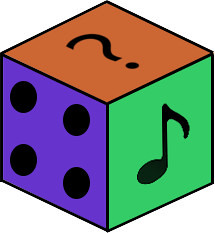
- Accompanist (role)
- Ad libitum
- Agenda
- Aleatoricism
- Aspect
- Balance
- Bartle types
- BCG
- (Cognitive) flow
- Conductor (role)
- Constellation
- Constructor (role)
- Co-optionality
- Cue cards
- Dice
- Dimension
- Downbeat
- Downtime
- Elegant Game
- Emergence
- End Condition
- Event (musical event)
- Extended technique
- Facilitator
- Fighting
- Flow
- Found sound
- Gameplay flow
- Genre
- Heteronomous Music
- Horizon of intent
- Improvisation rite
- Insert game
- Inspire cards
- Instrument Preparation
- Judge (role)
- Karaoke
- King-making
- Learning curve
- Ludomusical dissonance
- Meaningful Choice
- Mechanic
- Music game
- Non-idiomatic music
- Notation Cards
- Open work
- Parameter
- Pervasive Game
- Player (role)
- Prompter (role)
- Psychographics
- Quarterbacking
- Rhythm cards
- Rhythm game
- Roles
- RPG
- Rule Cards
- Speedrun
- Stacking
- Trading
- Transition
- Upgrade
- Victory condition
- Xenochrony
- XP
- Yes, and...
A phenomenon when thing's qualities are not due to any qualities of its parts but result from interactions between the parts.
Games as systems of rules
Complex systems often display some forms of emergence and usual examples are taken from nature (waves, snowflakes, insects' colonies) or from social sphere (stock exchange, works of art). Games are notorious for their emergent properties as rules are usually simple, but their interactions weave out new perceived qualities or entities (as larger parts of games). You can find emergence also in music, even at the very basic level of physics of sound.
Some games are based exclusively on emergence, but it's not always the case as some game may also rely on pre-defined content that is interactively discovered by players during the game. Game scholar Jesper Juul calls that type 'games of progression' ) although the name doesn't fit music games that well as in music we use progression in a different meaning. Quite often such games will have a clear division into stages and, in our case, stages will be connected by some kind of transition.
Because of the relative lack of pre-defined content, it's harder to treat games of emergence as authored pieces (usually 'algorithms' or 'procedures' don't receive copyright protection), and at the same time this type of game requires quite a lot of work to prepare because extensive playtesting is needed to make sure the game is balanced.
References
📜 Juul, Jesper. 2002. “The Open and the Closed: Games of Emergence and Games of Progression.” In Computer Games and Digital Cultures Conference Proceedings, edited by Frans Mäyra, 323–329. Tampere: Tampere University Press.
If you think anything should be added to this subpage, please drop a hint or a link for future editors.
